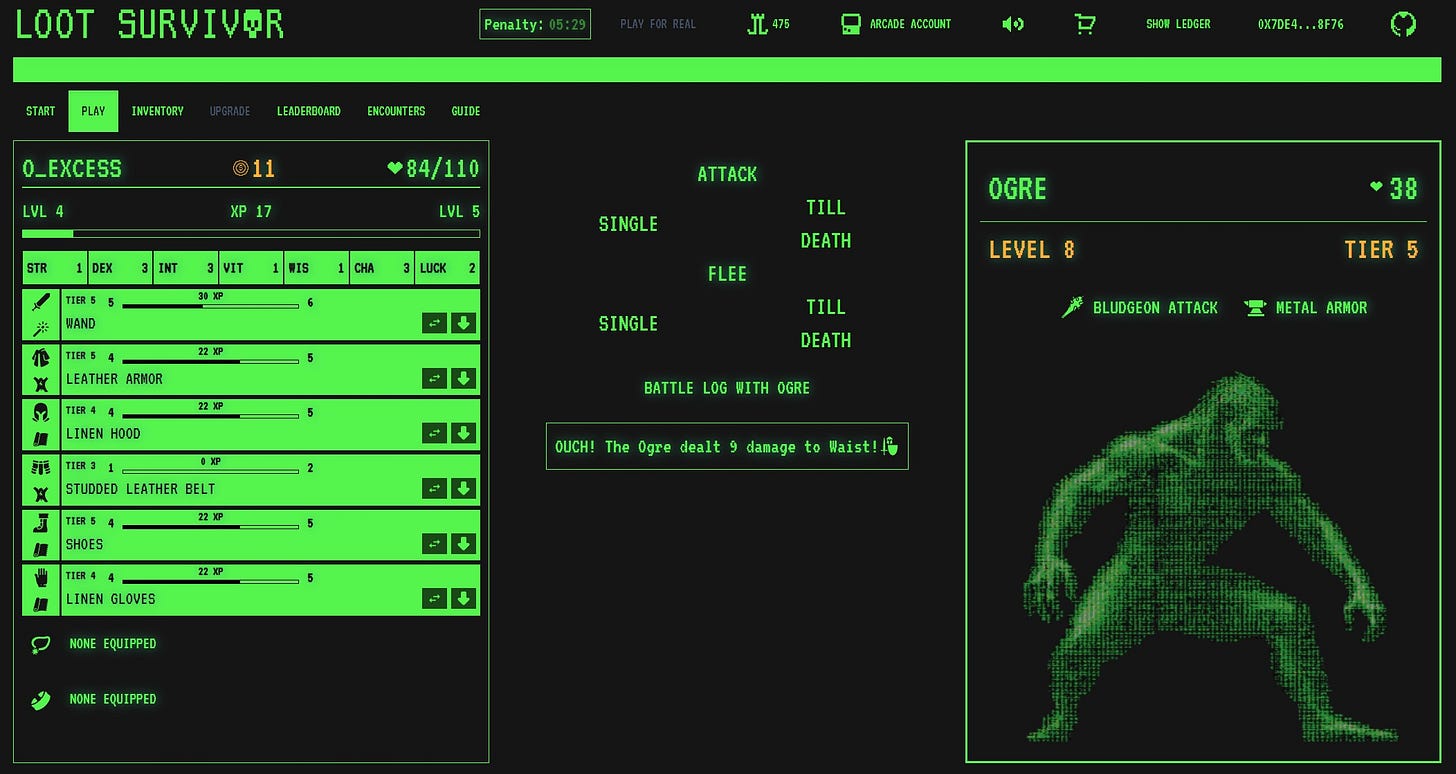Loot Survivor and the Emergence of Onchain Arcades
An Interview with Loot Survivor's Creator, Loothero
Loot Survivor is the inaugural game from the Realms Autonomous Worlds ecosystem and built by longtime Bibliotheca DAO member Loothero, featuring a unique Play2Die mechanic. Inspired by community-written lore and mechanics from the original Loot project, players combat beasts, clear obstacles and gather gear to survive and climb the leaderboard.
Features:
Loot Survivor adopts an "onchain arcade" model with several key aspects:
Simple, quick and inexpensive gameplay without the need for NFT assets.
Mimics traditional arcades: insert a few tokens, and you're in.
Average game time of around 10 minutes, suitable for quick adventures.
Accessible via a mobile client.
A key feature is its blockchain-backed, permanent leaderboard. This resolves a nagging issue in traditional arcades where high scores are often localized and can be lost due to power failures or resets. With the blockchain, scores are immutable and tamper-proof.
To reduce the steep learning curve of blockchain games, Loot Survivor introduces "Arcade Accounts." These allow new players to begin by scanning a QR code that grants them limited blockchain access for transaction fees and enough in-game currency for a single round. This eliminates the need for complex wallet setups or asset bridging.
Gameplay:
In Loot Survivor, players engage in a turn-based adventure as they delve deeper into the dungeon. Along the way, adventurers encounter a range of challenges, from battling fearsome monsters and navigating treacherous obstacles to discovering useful trinkets such as health potions or gold. Leveling occur rapidly, enabling players to enhance their attributes and acquire upgraded equipment—a necessity, as the dungeon's hazards grow progressively more challenging. Though the game doesn't have a traditional "win" condition, the ultimate objective is to survive for as long as possible and climb the leaderboards, evoking the spirit of classic arcade games.
Technical Challenges and Balance:
Balancing Loot Survivor has required particular attention due to the immutable nature of onchain development, which, according to Loothero, is similar to hardware development. Once launched, making adjustments can be a complex endeavor. This led to a six-month playtesting period to minimize the risk of major bugs and ensure that the game is well-balanced. Despite the low likelihood of serious issues, Loothero expressed confidence that the game's core structure is robust enough to allow for swift adaptations. On the subject of accessibility, Loothero acknowledged the initial cost barrier due to gas fees, which currently range from $5 to $10 per game. However, he anticipates that the forthcoming EIP 4844 update will significantly reduce these costs, making the game more financially accessible.
Economic Sustainability:
Loot Survivor prioritizes gameplay driven by players who enjoy the arcade experience and aim for high scores over financial speculation. Players pay a small fee of 25 Lords (around $2.50 USD) to join the game. Half of this fee goes to the top scorers as rewards, while the rest is shared between the game's DAO and the client provider. The game's financial model is transparent and encourages players to aim for high scores, offering a fresh alternative to the often speculative nature of blockchain gaming.
Future Outlook:
While Loothero’s immediate focus is on the game's imminent launch, future plans will depend on market reception. A successful launch could warrant an extension of the Loot Survivor model. Irrespective of the game's outcome, the development team remains committed to exploring provable programs and zero-knowledge proofs, considered as the future of scalable blockchain solutions.
Loothero also noted that the community will play a crucial role in Loot Survivor’s evolution. The decentralized architecture enables players to add new leaderboards or filtering options without modifying the core contract, thereby enriching the gaming experience. Developers can also use some of the original code from Loot Survivor to create similar dungeon crawl experiences for other genres or game worlds.
Next, a potential future modification might be the transition to zero knowledge proofs to hide gameplay and make it more challenging for players to mimic the moves or decisions of other high score earners. The tradeoffs here, however, involve a sacrifice of transparency for novel gameplay.
Finally, Loothero hinted that if Loot Survivor gains a sizable player base, the DAO may consider subsidizing the transaction fees, making the initial Lords fee the only cost to players.
Conclusion:
In summary, Loot Survivor brings together traditional arcade gaming and blockchain technology. Designed for quick, competitive experiences, it adds a new dimension to the gaming landscape with its unique 'on-chain arcade' model and plans for future expansion.
*By O_Excess with editing support from raulonastool
The Scribe’s Corner

**Disclosures: The content provided in this article is intended solely for informational and entertainment purposes. The article does not aim to provide investment, financial, or professional advice of any kind.







